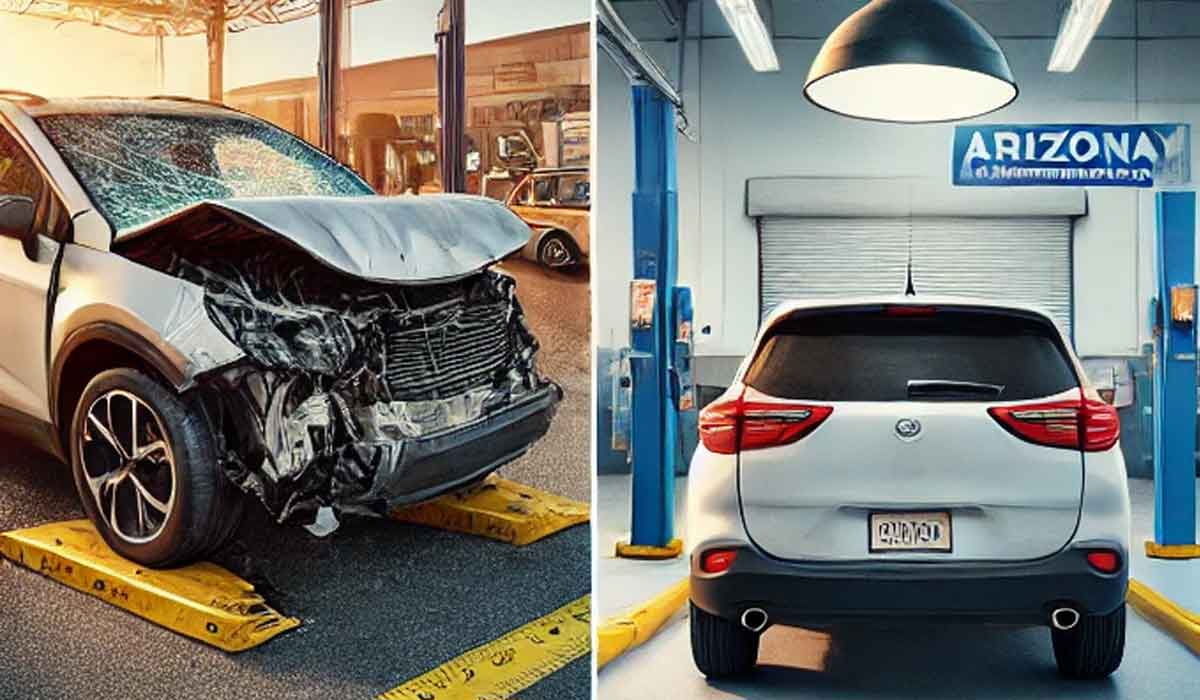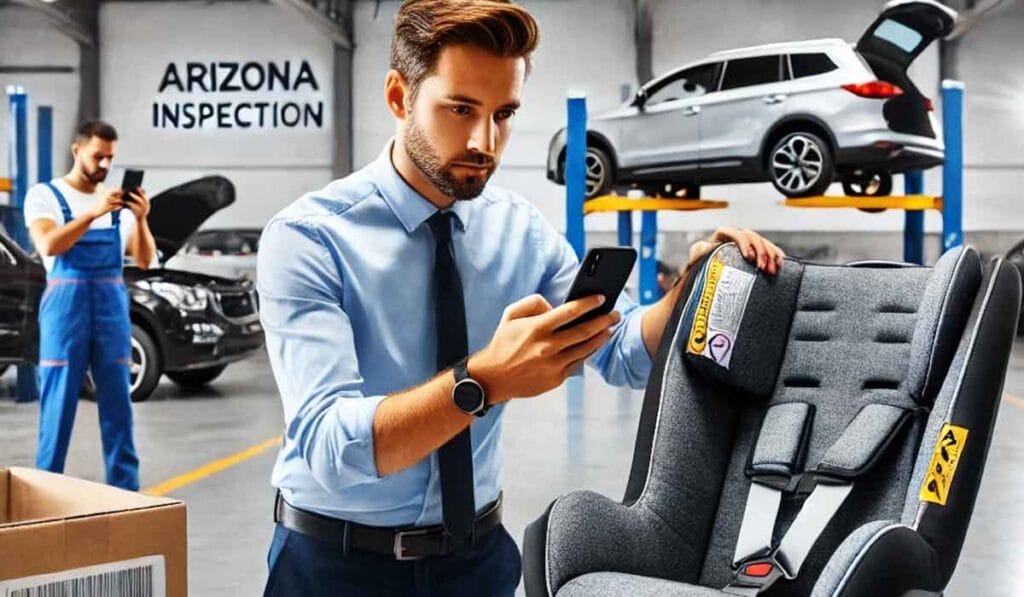The Ultimate Guide to Documenting Car Accident Claims in Arizona
Getting into an auto accident in Maricopa County can be scary and overwhelming.
Whether it happened on the busy I-17, I-10, Loop 101, or your local neighborhood street, knowing how to document everything properly can make a huge difference in your auto insurance claim.
Why Documentation Matters
Think of documentation as telling your side of the story with proof.
Just like taking pictures of your homework to show your teacher you did it, you need evidence to show the insurance company exactly what happened.
Good documentation helps you get fair compensation for medical bills, car repairs, and other expenses.
What Makes Maricopa County Different
Here in the Valley of the Sun, we face unique challenges regarding car accidents.
Our mix of busy city streets, desert highways, and year-round tourism means accidents can happen anywhere, anytime.
Plus, Arizona’s laws about car accidents and insurance are different from those of other states, so it’s important to know what applies specifically to Maricopa County.
What This Guide Will Cover
We’ve created this step-by-step guide to help you through the documentation process.
We’ll walk you through everything you need to do, from the moment of the accident to filing your insurance claim, to helping you set up a good recovery plan.
Consider it your friendly roadmap to handling all the paperwork and details after an accident.
Remember, being prepared and knowing what to document can make a stressful situation easier.
This guide will help you protect your rights and interests whether you are dealing with a minor fender-bender or a more serious collision.
Please note: We are accident doctors who charge you $0 out of pocket for the best medical care after a car accident.
You should come in and get treated by us first, and then let us refer you to the best auto accident attorneys in Phoenix or Mesa.
Key Takeaways
Documentation is Critical
- Take photos immediately – capture vehicle damage, injuries, and accident scene.
- Get a police report – required in Arizona for accidents with injuries or damage over $2,000.
- Save everything – keep all receipts, medical records, and communication records.
Medical Care Matters
- Get checked out immediately, even if you feel “okay.”
- Document all injuries with photos and medical records.
- Keep a daily log of your pain and progress in recovery.
Insurance Tips
- Report the accident to your insurance company right away.
- Don’t admit fault or say, “I’m fine,” at the accident scene.
- Consider uninsured/underinsured motorist coverage.
Legal Protection
- Arizona gives you 2 years to file a claim – but don’t wait.
- You can still recover damages even if you are partially at fault.
- Get medical care before talking to lawyers or insurance companies.
✨Pro Tip:
Visit us first for immediate medical care and documentation.
We’ll help organize everything and connect you with top accident lawyers in Phoenix and Mesa with zero out-of-pocket costs.
Immediate Steps Post-Accident

Reporting the Accident in Maricopa County
In Arizona, you must legally report any accident that results in injury, death, or property damage over $2,000.
Here’s what you need to know about properly reporting your accident.
When to Call 911
Call the police using 911 immediately if:
- Anyone is injured.
- Vehicles are blocking traffic.
- You suspect the other driver is under the influence.
- There’s significant vehicle damage.
- The other driver leaves the scene.
If It’s a Minor Accident
For minor fender-benders, you can:
- If the damage is less than $2,000, you can file a report online through the Arizona Department of Public Safety’s Citizen’s Collision Report system.
- Visit your local police precinct to file a report in person.
- Call the non-emergency police number at (602) 223-2000.
Getting a Police Report
When police respond to your accident, they’ll create an official report that includes:
- Details about the crash location and time.
- Information about all drivers involved.
- Witness statements.
- Officer’s observations about the accident.
- Preliminary assessment of fault.
Why the Police Report Matters
Getting a copy of the police report serves as an official record of what happened and can be crucial for:
- Filing your insurance claim.
- Proving who was at fault.
- Supporting any legal action you might need to take.
- Getting fair compensation for your damages..
Remember, failing to report an accident when required by law can result in serious consequences, including fines and potential criminal charges.
Even if you think the accident is minor, it is usually better to protect yourself by having an official report.
Collecting Information at the Accident Scene
When you can safely move around after an accident, gathering the right information can make a huge difference in your personal injury claims.
Here’s what you need to collect:
Driver Information
Get these details from all drivers involved:
- Full name and contact information.
- Driver’s license number.
- Insurance information, including company name and the auto insurance policy number.
- License plate number.
- Vehicle make, model, and year.
✨Pro tip:
Instead of writing everything down, take photos of the other driver’s license, registration, and insurance card with your phone.
This helps avoid mistakes and saves time.
Accident Scene Details
Document these important elements:
- Photos of all vehicle damage from multiple angles.
- Pictures of the entire accident scene.
- Images of skid marks or debris on the road.
- Pictures of any visible injuries.
- Weather conditions and road conditions.
- Traffic signs or signals near the accident.
Witness Information
If anyone saw the accident happen:
- Get their full names and phone numbers.
- Ask if they’re willing to describe what they saw briefly.
- Write down where they were when they witnessed the accident.
Additional Documentation
Remember to record:
- Exact location of the accident (cross streets or landmarks).
- Time and date.
- The direction each vehicle was traveling.
- Any unusual road conditions or construction.
Remember, it’s important to be thorough and stay safe while collecting this information.
If you’re injured or feel unsafe, wait for the police to arrive and help you gather these details.
Witness Statements
Getting good witness statements can make or break your insurance claim. Here’s how to handle this important task:
Approaching Witnesses
Be polite and friendly when asking witnesses for help.
Most people want to help, but they might be in a hurry.
Ask if they can spare just a few minutes to share what they saw.
What to Ask Witnesses
- Where were they when the accident happened?
- What exactly did they see before, during, and after the crash?
- What were the weather and road conditions like?
- Did they notice anything unusual about either driver’s behavior?
- Did they hear anything important, like screeching brakes or a horn?
Recording Their Statement
- Use your phone to record their statement if they agree.
- Ask them to write down what they saw if they have time.
- If they’re comfortable with that, take a photo of their business card or ID.
- Get their contact information for follow-up questions.
Preserving Evidence
Evidence can disappear quickly after an accident, so acting fast is important.
Here’s what you need to do:
Physical Evidence
- Keep all damaged personal items exactly as they are after the crash.
- Don’t wash or repair any clothing worn during the accident.
- Save any broken car parts that fell off during the crash.
- Store all damaged items in a safe, dry place.
Digital Evidence
- Take videos of the accident scene from all angles.
- Save dashcam footage if you have it.
- Screenshot any relevant text messages or emails.
- Download copies of weather reports from the day of the accident.
- Save any social media posts related to the accident.
Medical Evidence
- Keep all hospital bracelets and paperwork.
- Save receipts for medications and medical equipment.
- Take photos of visible injuries each day as they heal.
- Keep a daily journal about your pain and recovery.
Remember, you can never have too much evidence.
What might seem unimportant now could become crucial when filing a claim with insurance companies or legal matters.
Documenting Personal and Property Damage

Personal Injury Documentation
Getting the right medical care and keeping good records is crucial after an accident. Here’s what you need to do:
Medical Documentation
Go to the doctor even if you feel “okay” – some injuries show up days later.
- Take clear photos of visible injuries like cuts, bruises, or swelling.
- Keep a daily log of your pain levels and symptoms.
- Save all medical bills, prescriptions, and treatment plans.
- Request copies of all medical records and test results.
Track Your Recovery
- Write down how your injuries affect your daily life.
- Document any missed work days or activities you can’t do.
- Keep receipts for medical equipment like crutches or braces.
- Take photos of your injuries throughout the healing process.
Vehicle and Property Damage
Vehicle Damage Documentation
- Take photos of your vehicle from every angle, even undamaged areas.
- Get close-up shots of specific damaged areas.
- Take pictures of any parts that fell off your car.
- Document any warning lights on your dashboard.
- Get at least three repair estimates from different shops.
Important Details to Capture
- Take photos in good lighting.
- Include shots that show your license plate.
- Get pictures of the accident location and surrounding area.
- Document any damage to guardrails, signs, or other property.
- Save all repair estimates and receipts.
Rental Car Documentation
- Your insurance policy may cover rental car costs.
- Get written approval from your insurance company before renting.
- Keep all rental car agreements and receipts.
- Document the rental period and daily rates.
- Save fuel receipts and any additional charges.
Other Personal Property
Don’t forget about other items that might have been damaged in the crash:
Common Items to Document
- Cell phones, tablets, or laptops.
- Car seats and children’s items.
- Eyeglasses or medical devices.
- Jewelry or watches.
- Work equipment or tools.
How to Document These Items
- Take clear photos of damaged items.
- Keep receipts from when you bought these items.
- Get repair estimates if items can be fixed.
- Save receipts for replacement items.
- Make a list of everything damaged with estimated values.
Remember to document everything, no matter how small. Insurance companies need proof of all damages to process your claim properly.
Filing the Insurance Claim

Contacting the Insurance Company
Start your claim as soon as possible after the accident. Here’s how to handle it:
First Steps
- Call your insurance company’s claims department right away.
- Have your policy number ready when you call.
- Give them basic facts about when and where the accident happened.
- Avoid saying “I’m sorry” or admitting fault.
- Ask about your coverage and deductible amounts.
Information You’ll Need
- Your insurance policy number and contact details.
- Police report number and responding officer’s name.
- Other driver’s insurance and contact information.
- Photos and videos from the accident scene.
- Names and contact details of any witnesses.
Understanding the Claim Process
What Happens Next
- An insurance adjuster will contact you within 1-3 business days.
- The adjuster will schedule a time to inspect your vehicle.
- You’ll need to get repair estimates from approved auto shops.
- Keep track of all medical appointments and treatments.
- Save all receipts for accident-related expenses.
Timeline Tips
- Don’t rush to accept the first offer.
- Keep a log of every phone call with the insurance company.
- Ask for everything in writing.
- Know that most claims take 2-4 weeks to resolve.
- Complex claims might take longer, especially with injuries.
Dealing with Denials
Sometimes insurance companies deny claims, but don’t worry – you have options:
If Your Claim is Denied
- Stay calm and professional in all communications.
- Request a detailed written explanation for the denial.
- Review your policy carefully to understand your coverage.
- Gather additional evidence to support your claim.
- Keep copies of all new documentation.
Steps to Appeal
- Write a formal appeal letter explaining why you disagree.
- Include new evidence or documentation you’ve gathered.
- Get estimates or expert opinions to support your case.
- Consider hiring a lawyer if the denial seems unfair.
- Follow up regularly on your appeal’s status.
Remember, you’re your own best advocate.
Don’t hesitate to ask questions and push back if something seems wrong.
Many denied claims get approved after an appeal with the right documentation.
Legal Considerations
Hiring an Accident Lawyer
NOTE: At The Accident Doctors AZ, we work closely with the Valley’s top accident lawyers in Phoenix and Mesa.
Our team can connect you with experienced attorneys specializing in car accident cases and help you understand Arizona’s unique legal aspects.
When to Consider a Lawyer
- Your injuries are serious or long-lasting.
- The insurance company may deny your claim.
- The other driver was uninsured or underinsured.
- The fault in the accident isn’t clear.
- You’re missing work and losing income.
How a Lawyer Helps
- Handles all communication with insurance companies.
- Gathers and organizes your medical documentation.
- Calculate the true value of your claim.
- Negotiates for fair compensation.
- Represents you in court if needed.
State Laws and Regulations
Arizona’s Key Laws
- You have 2 years from the accident date to file a lawsuit.
- Arizona follows “comparative negligence” rules.
- Minimum insurance requirements are $25,000 per person/$50,000 per accident.
- You must report accidents with injuries or damage over $2,000.
- Police reports must be filed within 24 hours for serious accidents.
Liability Rules
- Multiple parties can share fault in an accident.
- Your percentage of fault may reduce your compensation.
- You can still recover damages even if you’re partially at fault.
- Insurance companies must handle claims in “good faith.”
- Medical providers must share records of your accident.
Uninsured/Underinsured Motorist Coverage
Understanding Your Coverage
- This coverage protects you if the other driver lacks insurance.
- It also helps when the other driver’s insurance isn’t enough.
- Coverage is optional but highly recommended in Arizona.
- Typical coverage ranges from $25,000 to $100,000.
- It can cover medical bills, lost wages, and pain and suffering.
Filing an Uninsured Motorist Claim
- Contact your insurance company immediately.
- Provide proof the other driver was uninsured.
- Submit all medical bills and documentation.
- Keep track of all accident-related expenses.
- Consider legal help for large uninsured claims.
Additional Documentation
Lost Wages and Missed Work
Documenting Income Loss
- – Get a detailed letter from your employer stating your normal work hours.
- Save copies of your recent pay stubs showing regular income.
- Keep track of all missed work days and appointments.
- Document any lost overtime or bonus opportunities.
- Save emails about missed meetings or projects.
Required Paperwork
- Ask your doctor for work excuse notes.
- Get written statements about work restrictions.
- Keep records of any work-from-home accommodations.
- Document any used sick time or vacation days.
- Save proof of canceled business trips or events.
Communication Records
Keeping Organized Records
- Create a dedicated folder for all accident-related papers.
- Write down the date and time of every phone call.
- Save all emails in a special email folder.
- Take notes during every conversation.
- Keep text messages and social media communications.
Important Details to Record
- Names and titles of people you speak with.
- Claim numbers and reference numbers.
- Promised follow-up dates and deadlines.
- Summary of what was discussed.
- Any agreements or decisions made.
Car Seat and Child Safety Equipment

Safety Equipment Claims
- Always replace car seats after an accident – it’s a safety must.
- Take photos of all damaged car seats and safety equipment.
- Save original purchase receipts if you have them.
- Document brand names, models, and purchase dates.
- Keep receipts for replacement items.
Important Tips
- Most insurance companies automatically cover car seat replacement.
- Don’t reuse car seats after any moderate to severe crash.
- Document any visible damage with close-up photos.
- Save the old car seat until your claim is settled.
- Keep all tags and manuals from new safety equipment.
Communication with Healthcare Providers
Medical Documentation Tips
- Ask for copies of all medical records and test results.
- Keep a log of all appointments and treatments.
- Request detailed notes about your injuries and progress.
- Save all prescriptions and treatment instructions.
- Document any referrals to specialists.
Working with Your Healthcare Team
- Tell your doctors the records are for an accident claim.
- Ask them to note how injuries relate to the accident.
- Request clear documentation of your recovery timeline.
- Keep records of all physical therapy sessions.
- Save receipts for medical equipment and supplies.
Remember, good documentation is your best tool for getting fair compensation.
When in doubt, save everything – you never know what might be important later.
Final Thoughts From Dr. Nguyen
Getting into a car accident is stressful enough without worrying about medical bills or paperwork.
I’ve seen too many accident victims delay getting the care they need because they’re worried about the cost or they’re overwhelmed by the whole process.
Here’s what makes our approach different:
- You can get immediate medical care for your injuries without paying anything out of pocket.
- No waiting for insurance approvals.
- No stressing about co-pays.
- Just the care you need when you need it.
Why See Us First?
Many accident victims don’t realize that getting proper medical care right away not only helps them heal better but also helps them document their car crash injuries properly.
Our team knows exactly what documentation insurance companies need, and we handle everything for you.
We’ve built a system that takes care of everything:
- Immediate medical care with zero upfront costs.
- Complete accident documentation.
- Connections to the Valley’s top accident lawyers.
- Coordination of your entire care plan.
Don’t let confusion about the process or worry about medical bills keep you from getting the care you deserve.
See us first before making any other decisions about your accident claim.
Let us help you organize and connect with the right professionals who will fight for your interests.
Ready to Get Help?
Visit our office in Phoenix or Mesa.
We’ll evaluate your injuries, start your treatment, and help you understand all your options at no out-of-pocket cost.
*Disclaimer: This article is for educational purposes only and does not constitute legal advice. Every accident case is unique, and results may vary.*
FAQs
How soon after a car accident should I see a doctor in Phoenix?
You should see a doctor immediately, even if you feel fine. Some injuries take days to show symptoms; early documentation is crucial for your claim. Our office provides immediate care with zero out-of-pocket costs, ensuring you get the treatment you need without financial stress.
What if I can’t afford medical treatment after my car accident?
You don’t need to pay anything upfront for medical treatment at our Phoenix or Mesa office. We work with your insurance claim and wait for settlement, meaning you can get immediate care without worrying about medical bills.
Should I take photos of my car damage if my insurance company is sending an adjuster?
Yes, always take your photos immediately after the accident. Take multiple angles of all vehicles involved and any visible injuries. Insurance adjusters may not arrive for days, and important evidence could be lost.
What documents do I need to keep after a car accident in Arizona?
Keep the police report, all medical records, photos of damage and injuries, witness contact information, and any communication with insurance companies. Also, save receipts for expenses related to the accident, including rental cars and medication.
How long do I have to document everything for my car accident claim in Arizona?
While Arizona gives you two years to file a claim, you should document everything immediately. Collect evidence at the accident scene, seek medical care immediately, and keep thorough records from day one.
Will my insurance rates go up if I get medical treatment after an accident?
Your rates shouldn’t increase for seeking necessary medical treatment after an accident that wasn’t your fault. Proper medical documentation helps prove the severity of your injuries and supports your claim.
Do I need a lawyer before seeing a doctor for my car accident injuries?
No, you should see a doctor first. At our office, we can help document your injuries properly and then connect you with experienced accident lawyers if needed. Getting proper medical care and documentation should be your priority.
What happens if the other driver’s insurance denies my claim?
Having proper documentation is your best defense against claim denial. We help you document everything correctly from the start and can connect you with top accident lawyers who handle denied claims.

